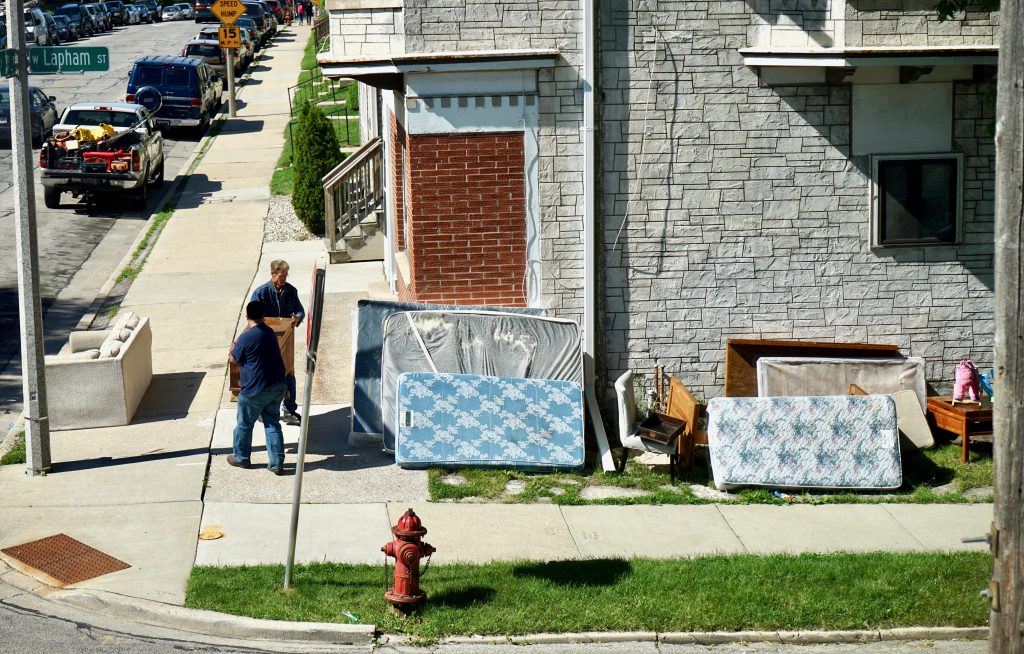Federal Ban On Evictions Extended
Until July 31. What you need to know.

The ban on evictions will be lifted July 31. “This is intended to be the final extension of the moratorium,” CDC leaders said in a news release. File photo by Adam Carr/NNS.
The Biden administration on Thursday extended a ban on evictions for a month to help struggling tenants, stressing that it is likely the last time the federal government will do so.
Dr. Rochelle Walensky, director of the Centers for Disease Control and Prevention, or CDC, said the new deadline is July 31. The ban on evictions had been set to expire June 30. “This is intended to be the final extension of the moratorium,” CDC leaders said in a news release.
Here are some things you should know:
Why did the CDC enact the ban?
The CDC originally enacted the halt on evictions to stem the spread of COVID–19, seasonal influenza and the increased risk of homeless shelters becoming overcrowded in fall and winter.
“The COVID-19 pandemic has presented a historic threat to the nation’s public health. Keeping people in their homes and out of crowded or congregate settings — like homeless shelters — by preventing evictions is a key step in helping to stop the spread of COVID-19,” the CDC says on its website.
What did the moratorium do anyway?
Tenants who have missed monthly rent payments were protected from being forced out of their homes if they declared financial hardship. It slowed but did not completely halt eviction filings. Milwaukee is still seeing hundreds of eviction filings each month but far fewer than in typical years, according to Eviction Lab.
What are landlords saying?
Officials representing the Apartment Association of Southeastern Wisconsin have urged their members “to continue to work diligently to help their renters apply and complete the application process for emergency rental assistance.”
“We have tenants that have been with us for over 30 years, and we have never raised their rent, not once,” said Ethel Armstead, who owns several properties in Milwaukee with her husband, JW. “Now even though the federal eviction moratorium says that people still have to pay rent . . . many tenants have taken it as they don’t have to pay since you can’t evict them.”
“It’s difficult to provide decent and affordable housing when you are only losing money. We know several landlords that are liquidating and getting out of the business because it’s almost impossible to make a profit if that’s your only source of income,” she said. “The housing market is booming and they’re taking advantage of it.”
Denisha Tate-McAlister, project director at the Dominican Center in Amani, said she sees this often.
“I’ve had cases where we personally worked with tenants, and they choose not to utilize the resources available to them, but they also won’t vacate people’s properties unless forced out,” Tate-McAlister said. “When they finally do leave, they leave messes and damage behind.”
“Some tenants don’t care about the property and landlords pay for it,” Armstead added.
What should I do now?
Tenants should seek help through rent assistance programs being administered by Community Advocates and the Social Development Commission, and they should reach out to the Milwaukee Rental Housing Resource Center for other housing issues.
Resources to consult if you’re worried about eviction
- Community Advocates rent helpline: 414-270-4646
- Legal Aid Society of Milwaukee: 414-727-5300
- Mediate Milwaukee: 414-939-8800
- Legal Action of Wisconsin: 855-947-2529
- Social Development Commission: 414-906-2700
- Milwaukee Autonomous Tenants Union: 414-410-9714
In case you missed it
Four main takeaways from “Making rent,” a conversation about eviction and tenant rights
Check out our Instagram Story on “Milwaukee resources to help you avoid evictions.”
Help is just a text away with our News414 project with our friends from Wisconsin Watch and Outlier Media. Text MILWAUKEE to 73224 to see how it works.
What renters need to know about the eviction process
UPDATE: Federal ban on evictions gets extended again. Here’s what you need to know was originally published by the Milwaukee Neighborhood News Service.
More about the Coronavirus Pandemic
- Governors Tony Evers, JB Pritzker, Tim Walz, and Gretchen Whitmer Issue a Joint Statement Concerning Reports that Donald Trump Gave Russian Dictator Putin American COVID-19 Supplies - Gov. Tony Evers - Oct 11th, 2024
- MHD Release: Milwaukee Health Department Launches COVID-19 Wastewater Testing Dashboard - City of Milwaukee Health Department - Jan 23rd, 2024
- Milwaukee County Announces New Policies Related to COVID-19 Pandemic - David Crowley - May 9th, 2023
- DHS Details End of Emergency COVID-19 Response - Wisconsin Department of Health Services - Apr 26th, 2023
- Milwaukee Health Department Announces Upcoming Changes to COVID-19 Services - City of Milwaukee Health Department - Mar 17th, 2023
- Fitzgerald Applauds Passage of COVID-19 Origin Act - U.S. Rep. Scott Fitzgerald - Mar 10th, 2023
- DHS Expands Free COVID-19 Testing Program - Wisconsin Department of Health Services - Feb 10th, 2023
- MKE County: COVID-19 Hospitalizations Rising - Graham Kilmer - Jan 16th, 2023
- Not Enough Getting Bivalent Booster Shots, State Health Officials Warn - Gaby Vinick - Dec 26th, 2022
- Nearly All Wisconsinites Age 6 Months and Older Now Eligible for Updated COVID-19 Vaccine - Wisconsin Department of Health Services - Dec 15th, 2022
Read more about Coronavirus Pandemic here




















